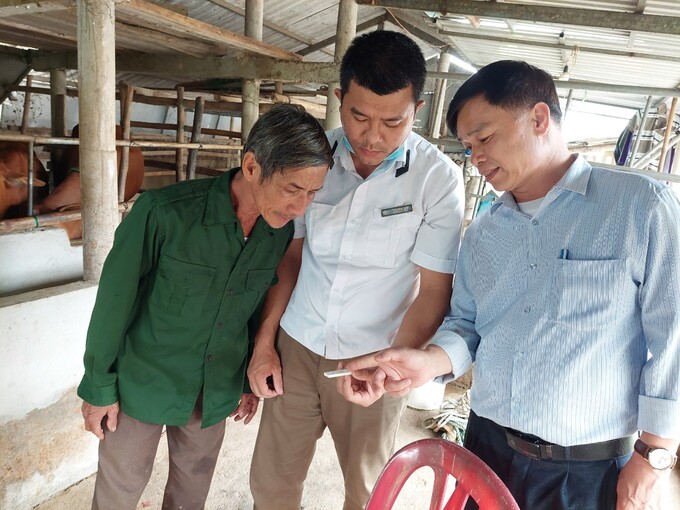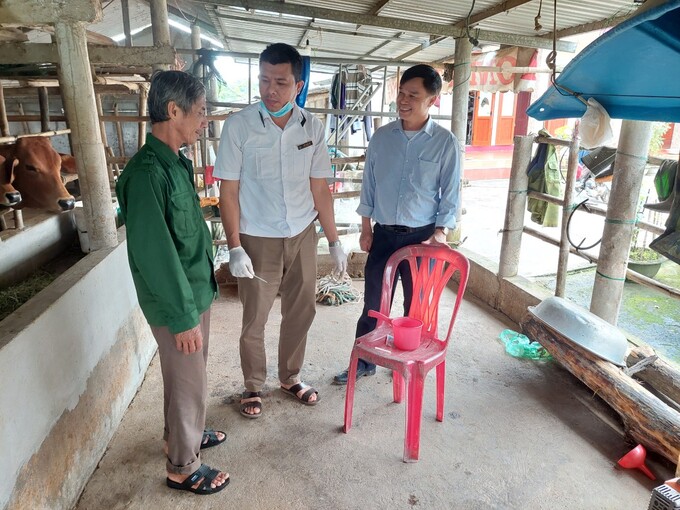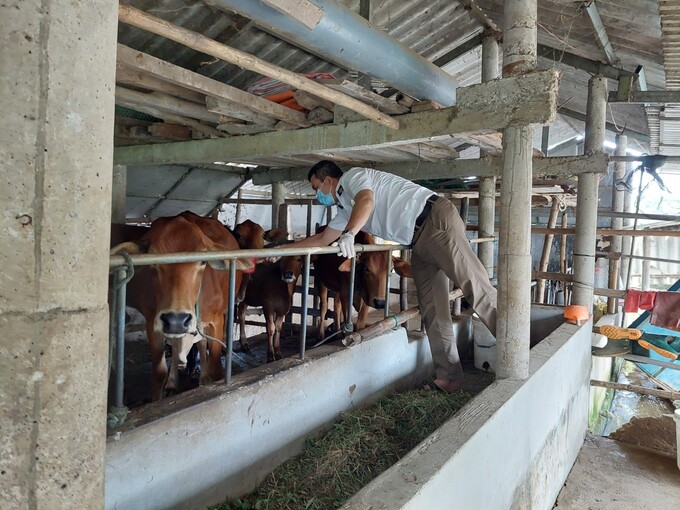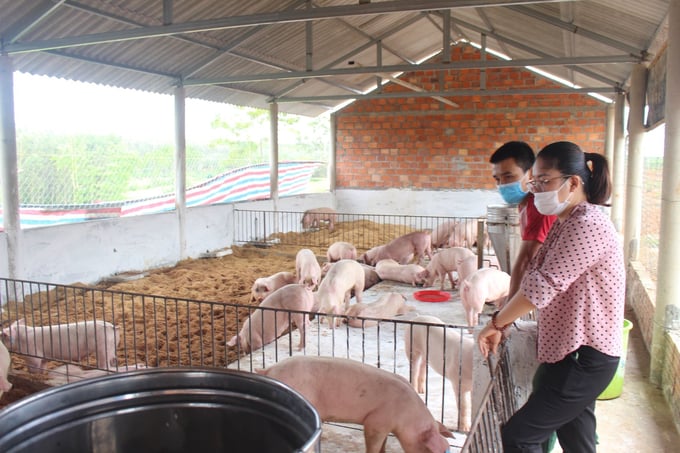Dangers of prohibited substances in livestock farming
At present, livestock in Quang Tri Province is recovering and gradually developing quite strongly. Total live meat production in 2022 is estimated at 56,306 tons. The structure of animal production is gradually shifting from agriculture towards high technology and biosecurity.
The province currently has 629 livestock farms, of which over 60 livestock farms are linked to animal feed companies. In addition to implementing synchronous livestock herd development solutions, Quang Tri Province’s agricultural sector has stepped up work to prevent and end the business and use of banned substances in livestock farming.

Officials from the Quang Tri Animal Husbandry and Veterinary Sub-Department inspect banned substances at the ranch. Picture: Viet Toan.
According to Circular No. 21 of November 28, 2019 from the Ministry of Agriculture and Rural Development, there are currently 25 banned substances that cannot be used in animal husbandry. Among them, the 03 most popular substances are Clenbuterol, Cysteamine and Salbutamol (commonly known as Lean and Weight Gainers). Getting into the animal’s body, these substances easily remain in the meat. If people eat meat containing these substances, it will affect health. Acute poisoning can cause cardiac arrhythmia, muscle tremors, bronchospasm, increased blood pressure and the risk of miscarriage. In the case of chronic poisoning, if people use food containing prohibited substances for a long time, it can cause liver toxicity, which can lead to disruption of the body’s endocrine system, to the heart, can cause cancer complications, damage the nervous system , circulatory system, even lead to death …
In addition, the use of banned substances in animal husbandry not only harms consumer health, but also confuses consumer psychology, which affects the reputation of livestock farming.
Prohibited substances are currently still being used in livestock farming. The reason why farmers use banned substances in animal production even though they know it is illegal is because their awareness of the harmful effects of banned substances and lean substances in animal production is still very limited. In addition, the use of some substances such as clenbuterol, cysteamine and salbutamol causes the cattle to have a high lean rate and gain weight faster than normal cattle, causing farmers to evict out of greed.

The Quang Tri Subdivision of Animal Husbandry and Veterinary Medicine regularly organizes propaganda for farmers about the dangers of using banned substances in animal husbandry. Picture: Viet Toan.
Engineer Doan Tran Anh Minh, Subdivision of Animal Husbandry and Veterinary Medicine of Quang Tri Province said: In terms of sanctions, currently, the use of prohibited substances in livestock can be prosecuted for criminal liability or fined for violations. Regarding the sanctioning of administrative violations, Article 28 of Government Decree No. 14/2021/ND-CP of March 1, 2021 on the Rules on Sanctioning Administrative Violations in Livestock Production according to Section 4 provides: a fine of VND 50,000. 000 to 60,000,000 VND will be imposed for the use of each prohibited substance in animal husbandry, but not up to the amount of criminal prosecution; A fine of between VND70,000,000 and VND80,000,000 will be imposed for the use of any prohibited substance in livestock pending criminal prosecution, but the investigating body has decided not to pursue criminal proceedings, to cease the investigation or to drop the case. In addition, the violent destruction of Prohibited Substances and pets that used Prohibited Substances for the above violations.
Specimens no longer detected positive for Prohibited Substances
In Quang Tri Province, preventing and controlling the trafficking of banned substances in animal husbandry is considered an urgent task. In order to proactively prevent and promptly detect the use of banned substances in farm animals, Quang Tri Agriculture Sector has strengthened management, inspection, inspection, supervision and strict treatment of violation cases. .
Quang Tri Province has a total herd of 195,000 pigs, 20,500 buffalo and 55,900 cows. Recently, the provincial sub-department of animal husbandry and veterinary medicine inspected livestock production activities on farms and livestock households in most counties, cities and townships in the province. The inspection showed that farms and livestock farms in Quang Tri Province, in addition to strict compliance with animal feed regulations and non-use of prohibited substances, also implemented environmental, school and disease prevention regulations quite well.

Through inspection and monitoring, it sends a positive signal in the control of banned substances from livestock. Picture: Viet Toan.
Regarding animal feed, most of the products supply from big, reputable and reputable companies and companies. In parallel with the inspection activities, Quang Tri Sub-Department of Livestock and Veterinary Medicine recently organized a quick rehearsal to test salbutamol to check the use of banned substances in cattle (buffalo, cow, pig) in 19 slaughterhouses. When 40 samples were tested (including 28 bovine urine samples and 12 pig urine samples), all the results were negative for the Prohibited Substance salbutamol.
As a veteran pig farmer who rears a large number of pigs, Mr. Le Hoai Phu in Phuong An 2 Village, Cam Nghia Township, Cam Lo District shared, “Over the years, I’ve also heard through the mass media about lean substances, a banned substance in animal husbandry.My family has been feeding pigs since pig breeding only with feed from well-known companies on the production market, combined with additives products in family agricultural production.
In addition to regularly vaccinating the livestock, my family only uses tonic and vitamin products from well-known companies to increase the pigs’ resistance during breeding and when the weather changes. We don’t mix prohibited substances in animal feed because I know if it’s against the law and my conscience doesn’t allow it…’.
Mr. Duong Van An from Huu Hoa Hamlet, Trieu Hoa Township, Trieu Phong District said: Since 2016, his family has developed a cattle breeding model with an average of 15 to 20 animals. “When raising livestock, I always apply science and technology to ensure disease safety control, environmental rehabilitation and the promotion of biologically safe breeding. Also, using local food sources for livestock development and using prohibited substances, foods containing prohibited substances to ensure the health of family and community is the most taboo.” Lord speaks.

Through disease-proof breeding models, Quang Tri farmers are increasingly aware of reducing pollution and saying “no” to banned substances in livestock farming. Picture: Viet Toan.
Ho Ngoc Quynh, head of the slaughter control team of the Trieu Phong District Animal Husbandry and Veterinary Station, said it follows the guidance of the Quang Tri Province Ministry of Agriculture and Rural Development and the guidance of the province’s Sub-Ministry of Livestock Husbandry and Animal Health, the Animal Husbandry Station , Animal Husbandry and Veterinary Medicine of Trieu Phong District, has worked with cities and towns to go to slaughterhouses and livestock farms to inform people about the harmful effects of using prohibited substances in livestock Do not use prohibited substances in farm animals…
Apparently, the fact that farms, farms and livestock farms in Quang Tri province are saying “no” to banned substances in livestock has helped in part to make consumers feel safe using locally sourced meat products, but it’s not possible , to fully confirm that in the future time there will be no phenomenon of the use of banned substances in animal husbandry in the province, because small-scale animal husbandry is still common and not humane. Every breeder is aware of the dangers of banned substances.
Meanwhile, the inspection and control of functional branches still face many difficulties; thin power, limited annual budget for sample testing, high price for samples for testing and analysis… Overcome these difficulties, implement the instruction of the Ministry of Agriculture and Rural Development to strengthen testing for banned substances in animal husbandry, the sub-department of animal husbandry and Veterinary Medicine of Quang Tri Province has always done well in the state animal husbandry administration.
Mr. Dao Van An, deputy director of Quang Tri Province Livestock and Veterinary Sub-department, said that in the coming period, along with increasing sampling activities in livestock households and slaughterhouses, the sub-department will continue to guide animal husbandry and veterinary bureaus in counties, cities and townships for reinforcement the propaganda and dissemination of the dangers of the use of prohibited substances in animal husbandry for public health; the legal provisions for violations in the area of animal husbandry; timely and accurate information of people about the situation and identity of violators, if any…
In addition to strengthening state management in the livestock sector, the Quang Tri Sub-Department of Livestock and Veterinary Medicine has implemented measures to protect livestock herds while directing manufacturing plants and farms to tackle farms and households and align agricultural production towards VietGAP to create products that are safe for consumers, ensure environmental hygiene and develop sustainable livestock farming…

